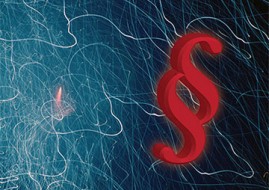Rewarding Turncoat Lawyer: “Jamaica Public Service Co. v. AIU Insurance Co.”
By Ronald C. Minkoff [Originally published in NYPRR March 1999]
For many years, courts and Bar Ethics Committees have struggled to deal with the problem of the turncoat attorney: The attorney who represents a client, obtains the client’s confidential information and then, months or years later, offers that information in a lawsuit against the same client. Two provisions of the New York Lawyer’s Code of Professional Responsibility are relevant to this problem: DR 4-101 and DR 5-108. DR 4-101(A) defines the terms “confidence” and “secret.” A confidence is any information protected by the attorney-client privilege. A secret is any information gained in the attorney-client relationship that the client has asked be held inviolate or the disclosure of which would be embarrassing, or likely to be detrimental, to the client. DR 4-104(B) provides that a lawyer may not knowingly reveal a client’s confidence or secret, except when permitted under DR 4-101(C). The 4-101(C) exceptions are not relevant to this discussion.
DR 5-108 prohibits a lawyer from opposing a former client in a “substantially related matter” or from using any confidences and secrets of the client except as permitted under DR 4-101(C) or when the confidence or secret has become “generally known.”
Together, DR 4-101 and DR 5-108 set forth the rules which protect a lawyer’s former clients. Ethical Consideration 4-6 makes clear that the lawyer’s obligation to protect his client’s confidences and secrets “continues after the termination of employment.”
Former Decisions Adhere to Rules
The New York Court of Appeals had long seemed committed to applying these provisions strictly, hoping “to free … former client(s) from any apprehension that matters disclosed to an attorney will subsequently be used against (them) in a related litigation.” [See, e.g., Solow v. Grace & Co., 83 N.Y.2d 303, 309 (1994).] Just over two years ago, in Tekni-Plex, Inc., v. Meyner and Landis [89 N.Y.2d 123 (1996)], the Court disqualified a law firm which had represented a company for 33 years when the firm tried to represent the company’s former owner hi a dispute with the company’s purchaser, all because the law firm had been privy, before the purchase, to confidences of the purchaser.
Decision in Jamaica a Surprise
For that reason, Jamaica Public Service Co. Ltd. v. AIU Insurance Co., the court’s latest decision in this area, comes as a surprise. The plaintiff, represented by the firm of Mendes & Mount, sued to recover on an insurance policy after its boiler exploded. It named AIU Insurance Co. (AIU) as a defendant after being told AIU was responsible for the coverage. The plaintiff later sought to add two other entities as defendants, claiming that the additional entities and AIU were all affiliates or subsidiaries of American International Group, Inc. (AIG). The defendants contended that AIU was an underwriter, not an insurer, and that this was well known in the insurance industry. To counter this argument, the plaintiff submitted the affidavit of Peter Samaan, a Mendes & Mount attorney who had once worked for AIG, although not for one of the named defendants. Samaan stated, among other things, that he had heard of AIU while working at AIG but had not known that it was an underwriter, and that AIG’s corporate structure was “most confusing.”
AIU moved to disqualify Mendes & Mount. The trial court granted the motion and the First Department affirmed, making clear that Samaan’s participation against this former client (AIG) violated DR 5-108. The First Department held that while employed at AIG, Samaan had been:
“involved with issues relevant to the present litigation and … possessed confidences and secrets obtained as in-house counsel that are substantially related to issues in the present litigation, in particular the complex corporate structure of the holding company owning interests in (AIU) and certain other defendants and the interrelationship of such defendants.”
Court Reverses Appellate Division
The Court of Appeals reversed. The Court began by assuming (without deciding) that AIU could be considered Samaan’s former client. (The Court said it would “leave for another day” the question of whether “prior employment by one member of a large corporate family was tantamount to an attorney-client relationship with other members of that family.”)
The Court then found that Mendes & Mount had violated neither prong of DR 5-108. First, the Court ruled that Samaan’s prior work at AIG was not “substantially related” to Mendes & Mount’s current representation, because Samaan had not worked for any of the named defendants and had not participated in coverage disputes. Second, the Court held that even if the information in the affidavit might otherwise qualify as a “confidence” or “secret,” that information could be disclosed under DR 5-108(A)(2) because it had become “generally known” through “trade periodicals and filings with State and Federal regulators.”
Court’s Jamaica Decision Troubling
The Court’s rulings are troubling on both the facts and the law. If Salaam’s prior work was not “substantially related” to the current lawsuit, how is that he knew enough to submit an affidavit regarding a crucial fact issue? And if the information he disclosed was “generally known,” why did Mendes & Mount need to submit his affidavit in the first place, rather than rely on the supposedly public information?
Indeed, the Court defined as “generally known” — and thus no longer subject to protection as a confidence or secret — information which, if Samaan had not disclosed it, Mendes & Mount could have found only by rooting around in trade periodicals and regulatory filings. This sweeping limitation on the protection of confidences and secrets ignores the much narrower reading of DR 5-108 favored by many commentators. That reading would permit disclosure only of those confidences and secrets which had “already received widespread publicity.” [See, R. Simon, Simon’s New York Code of Professional Responsibility Annotated (1998 ed.), p. 258.] The court ignores the fact that courts and commentators have long viewed non-discloseable “secrets” to include such publicly disclosed — but difficult to learn about — matters as an individual client’s prior criminal record, or a corporate client’s internal policies and procedures. [See, Nassau Court Bar Opinion 96-7.] Finally, it ignores the Court’s own words in Tekni-Plex (supra):
The rule of disqualification (of DR 5-108) fully protects a client’s secrets and confidences by preventing even the possibility that they will subsequently be used against the client in related litigation… By mandating disqualification irrespective of any actual detriment … the rule also avoids any suggestion of actual impropriety on the part of the attorney.
In sum, the Jamaica Public Service decision represents a disturbing retreat from the Court’s oft-stated goal of protecting clients from unwarranted disclosure of confidences and secrets, and is a step backward in the battle against turncoat attorneys.
Ronald C. Minkoff is a partner at Beldock, Levine & Hoffman, LLP, specializing in commercial litigation. He is also Adjunct Assistant Professor of Professional Responsibility at Brooklyn Law School, and Chair, Committee on Professional Discipline of The Association of The Bar of The City of New York.
DISCLAIMER: This article provides general coverage of its subject area and is presented to the reader for informational purposes only with the understanding that the laws governing legal ethics and professional responsibility are always changing. The information in this article is not a substitute for legal advice and may not be suitable in a particular situation. Consult your attorney for legal advice. New York Legal Ethics Reporter provides this article with the understanding that neither New York Legal Ethics Reporter LLC, nor Frankfurt Kurnit Klein & Selz, nor Hofstra University, nor their representatives, nor any of the authors are engaged herein in rendering legal advice. New York Legal Ethics Reporter LLC, Frankfurt Kurnit Klein & Selz, Hofstra University, their representatives, and the authors shall not be liable for any damages resulting from any error, inaccuracy, or omission.
Related Posts
« Three 1998 Nassau Bar Ethics Committee Opinions Do I Have to Keep These Old Files? »








